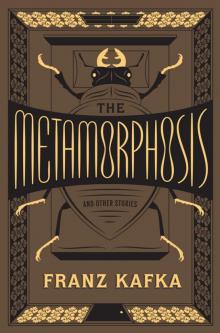- Home
- Franz Kafka
Metamorphosis and Other Stories Page 13
Metamorphosis and Other Stories Read online
Page 13
Gregor spent his days and nights almost without sleeping. Sometimes he thought that the next time they opened the door he would take the business of the family in hand, just exactly as he had done before; after a long time the director figured in his thoughts again, and the chief clerk, the junior clerk and the trainees, the dim-witted factotum, a couple of friends he had in other companies, a chambermaid in a hotel out in the provinces somewhere, a sweet, fleeting memory, a cashier in a hat shop whom he had courted assiduously, but far too slowly – all these appeared to him, together with others he never knew or had already forgotten, but instead of helping him and his family, they were all inaccessible to him, and he was glad when they went away again. And then he wasn’t in the mood to worry about the family, but instead was filled with rage at how they neglected him, and even though he couldn’t imagine anything for which he had an appetite, he made schemes as to how to inveigle himself into the pantry, to take there what was rightfully his, even if he didn’t feel the least bit hungry now. No longer bothering to think what might please Gregor, his sister before going to work in the morning and afternoon now hurriedly shoved some food or other into Gregor’s room with her foot, and in the evening reached in with the broom to hook it back out again, indifferent as to whether it had been only tasted or even – as most regularly happened – had remained quite untouched. The tidying of the room, which she now did always in the evening, really could not have been done more cursorily. The walls were streaked with grime, and here and there lay little tangled balls of dust and filth. At first, Gregor liked to take up position, for her coming, in the worst affected corners, as if to reproach her for their condition. But he could probably have stayed there for weeks without his sister doing anything better; after all, she could see the dirt as clearly as he could, she had simply taken it into her head to ignore it. And at the same time, with a completely new pernicketiness that seemed to have come over her, as it had indeed the whole family, she jealously guarded her monopoly on the tidying of Gregor’s room. On one occasion, his mother had subjected Gregor’s room to a great cleaning, involving several buckets full of water – the humidity was upsetting to Gregor, who lay miserably and motionlessly stretched out on the sofa – but his mother didn’t get away with it either. Because no sooner had his sister noticed the change in Gregor’s room that evening than, mortally offended, she ran into the sitting room, and ignoring her mother’s imploringly raised hands, burst into a crying fit that her parents – her father had of course been shaken from his slumbers in his armchair – witnessed first with helpless surprise, and then they too were touched by it; his father on the one side blaming Gregor’s mother for not leaving the cleaning of the room to his sister; while on the other yelling at the sister that she would never be allowed to clean Gregor’s room again; while the mother tried to drag the father, who was quite beside himself with excitement, into the bedroom; his sister, shaken with sobs, pummelled at the table with her little fists; and Gregor hissed loudly in impotent fury that no one thought to shut the door, and save him from such a noise and spectacle.
But even if his sister, exhausted by office work, no longer had it in her to care for Gregor as she had done earlier, that still didn’t mean that his mother had to take a hand to save Gregor from being utterly neglected. Because now there was the old charwoman. This old widow, who with her strong frame had survived everything that life had had to throw at her, was evidently quite undismayed by Gregor. It wasn’t that she was nosy, but she had by chance once opened the door to Gregor’s room, and at the sight of Gregor, who, caught out, started to scurry hither and thither, even though no one was chasing him, merely stood there with her hands folded and watched in astonishment. Since then, she let no morning or evening slip without opening the door a crack and looking in on Gregor. To begin with, she called to him as well, in terms she probably thought were friendly, such things as: ‘Come here, you old dung-beetle!’ or ‘Will you take a look at that old dung-beetle!’ Gregor of course didn’t reply, but ignored the fact that the door had been opened, and stayed just exactly where he was. If only this old charwoman, instead of being allowed to stand and gawp at him whenever she felt like it, had been instructed to clean his room every day! Early one morning – a heavy rain battered against the windowpanes, a sign already, perhaps, of the approaching spring – Gregor felt such irritation when the charwoman came along with her words that, albeit slowly and ponderously, he made as if to attack her. The charwoman, far from being frightened, seized a chair that was standing near the door, and as she stood there with mouth agape it was clear that she would only close it when she had brought the chair crashing down on Gregor’s back. ‘So is that as far as it goes then?’ she asked, as Gregor turned away, and she calmly put the chair back in a corner.
Gregor was now eating almost nothing at all. Only sometimes, happening to pass the food that had been put out for him, he would desultorily take a morsel in his mouth, and keep it there for hours, before usually spitting it out again. At first he thought it was grief about the condition of his room that was keeping him from eating, but in fact the alterations to his room were the things he came to terms with most easily. They had started pushing things into his room that would otherwise have been in the way, and there were now a good many such items, since one room in the flat had been let out to a trio of bachelors. These serious-looking gentlemen – all three wore full beards, as Gregor happened to see once, peering through a crack in the door – were insistent on hygiene, not just where their own room was concerned, but throughout the flat where they were now tenants, and therefore most especially in the kitchen. Useless or dirty junk was something for which they had no tolerance. Besides, they had largely brought their own furnishings with them. For that reason, many things had now become superfluous that couldn’t be sold, and that one didn’t want to simply throw away either. All these things came into Gregor’s room. And also the ashcan and the rubbish-bin from the kitchen. Anything that seemed even temporarily surplus to requirements was simply slung into Gregor’s room by the charwoman, who was always in a tearing rush; it was fortunate that Gregor rarely saw more than the hand and the object in question, whatever it was. It might be that the charwoman had it in mind to reclaim the things at some future time, or to go in and get them all out one day, but what happened was that they simply lay where they had been thrown, unless Gregor, crawling about among the junk, happened to displace some of it, at first perforce, because there was simply no more room in which to move, but later on with increasing pleasure, even though, after such peregrinations he would find himself heartsore and weary to death, and wouldn’t move for many hours.
Since the tenants sometimes took their supper at home in the shared living room, the door to it remained closed on some evenings, but Gregor hardly missed the opening of the door. After all, there were enough evenings when it had been open, and he had not profited from it, but, instead, without the family noticing at all, had merely lain still in the darkest corner of his room. On one occasion, however, the charwoman had left the door to the living room slightly ajar, and it remained ajar, even when the tenants walked in that evening, and the lights were turned on. They took their places at the table, where previously father, mother and Gregor had sat, unfurled their napkins and took up their eating irons. Straightaway his mother appeared in the doorway carrying a dish of meat, and hard behind her came his sister with a bowl heaped with potatoes. The food steamed mightily. The tenants inclined themselves to the dishes in front of them, as though to examine them before eating, and the one who was sitting at the head of the table, and who seemed to have some authority over the other two flanking him, cut into a piece of meat in the dish, as though to check whether it was sufficiently done, and didn’t have to be sent back to the kitchen. He seemed content with what he found, and mother and sister, who had been watching in some trepidation, broke into relieved smiles.
The family were taking their meal in the kitchen. Even so, before going in there, the father came
in and with a single reverence, cap in hand, walked once round the table. All the tenants got up and muttered something into their beards. Once they were on their own again, they ate in near silence. It struck Gregor that out of all the various sounds one could hear, it was that of their grinding teeth that stood out, as though to demonstrate to Gregor that teeth were needed to eat with, and the best toothless gums were no use. ‘But I do have an appetite,’ Gregor said to himself earnestly, ‘only not for those things. The way those tenants fill their boots, while I’m left to starve!’
On that same evening – Gregor couldn’t recall having heard the violin once in all this time – it sounded from the kitchen. The tenants had finished their supper, the one in the middle had produced a newspaper, and given the other two a page apiece, and now they were leaning back, reading and smoking. When the violin sounded, they pricked up their ears, got up and tiptoed to the door of the hallway where they stayed pressed together. They must have been heard from the kitchen, because father called: ‘Do the gentlemen have any objection to the music? It can be stopped right away.’ ‘On the contrary,’ said the middle gentleman, ‘mightn’t the young lady like to come in to us and play here, where it’s more cosy and convenient?’ ‘Only too happy to oblige,’ called the father, as if he were the violin player. The gentlemen withdrew to their dining room and waited. Before long up stepped the father with the music stand, the mother with the score, and the sister with the violin. Calmly the sister set everything up in readiness; the parents, who had never let rooms before, and therefore overdid politeness towards the tenants, didn’t even dare to sit in their own chairs; Gregor’s father leaned in the doorway, his right hand pushed between two buttons of his closed coat; Gregor’s mother was offered a seat by one of the gentlemen, and, not presuming to move, remained sitting just where the gentleman had put her, off in a corner.
The sister began to play; father and mother, each on their respective side, attentively followed the movements of her hands. Gregor, drawn by the music, had slowly inched forward, and his head was already in the living room. He was no longer particularly surprised at his lack of discretion, where previously this discretion had been his entire pride. Even though now he would have had additional cause to remain hidden, because as a result of the dust that lay everywhere in his room, and flew up at the merest movement, he himself was covered with dust; on his back and along his sides he dragged around an assortment of threads, hairs and bits of food; his indifference to everything was far too great for him to lie down on his back, as he had done several times a day before, and rub himself clean on the carpet. And, in spite of his condition, he felt no shame at moving out on to the pristine floor of the living room.
Admittedly, no one paid him any regard. The family was completely absorbed by the violin playing; the tenants, on the other hand, hands in pockets, had initially taken up position far too close behind the music stand, so that they all could see the music, which must surely be annoying to his sister, but before long, heads lowered in half-loud conversation, they retreated to the window, where they remained, nervously observed by the father. It really did look all too evident that they were disappointed in their expectation of hearing some fine or entertaining playing, were fed up with the whole performance, and only suffered themselves to be disturbed out of politeness. The way they all blew their cigar smoke upwards from their noses and mouths indicated in particular a great nervousness on their part. And yet his sister was playing so beautifully. Her face was inclined to the side, and sadly and searchingly her eyes followed the columns of notes. Gregor crept a little closer and held his head close to the ground, so as to be prepared to meet her gaze. Could he be an animal, to be so moved by music? It was as though he sensed a way to the unknown sustenance he longed for. He was determined to go right up to his sister, to pluck at her skirt, and so let her know she was to come into his room with her violin, because no one rewarded music here as much as he wanted to reward it. He would not let her out of his room, at least not as long as he lived; for the first time his frightening form would come in useful for him; he would appear at all doors to his room at once, and hiss in the faces of attackers; but his sister wasn’t to be forced, she was to remain with him of her own free will; she was to sit by his side on the sofa, and he would tell her he was resolved to send her to the conservatory, and that, if the calamity hadn’t struck, he would have told everyone so last Christmas – was Christmas past? surely it was – without brooking any objections. After this declaration, his sister would burst into tears of emotion, and Gregor would draw himself up to her oxter and kiss her on the throat, which, since she’d started going to the office, she wore exposed, without a ribbon or collar.
‘Mr Samsa!’ cried the middle of the gentlemen, and not bothering to say another word, pointed with his index finger at the slowly advancing Gregor. The violin stopped, the middle gentleman first smiled, shaking his head, at his two friends, and then looked at Gregor once more. His father seemed to think it his first priority, even before driving Gregor away, to calm the tenants, though they were not at all agitated, and in fact seemed to find Gregor more entertaining than they had the violin playing. He hurried over to them, and with outspread arms tried simultaneously to push them back into their room, and with his body to block their sight of Gregor. At this point, they seemed to lose their temper. It wasn’t easy to tell whether it was the father’s behaviour or the understanding now dawning on them that they had been living next door to someone like Gregor. They called on the father for explanations, they too started waving their arms around, plucked nervously at their beards, and were slow to retreat into their room. In the meantime, Gregor’s sister had overcome the confusion that had befallen her after the sudden interruption in her playing, had, after holding her violin and bow in her slackly hanging hands a while and continuing to read the score as if still playing, suddenly got a grip on herself, deposited the instrument in the lap of her mother who was still sitting on her chair struggling for breath, and ran into the next room, which the tenants, yielding now to pressure from her father, were finally more rapidly nearing. Gregor could see how, under the practised hands of his sister, the blankets and pillows on the beds flew up in the air and were plumped and pulled straight. Even before the gentlemen had reached their room, she was finished with making the beds, and had slipped out. Father seemed once more so much in the grip of his stubbornness that he quite forgot himself towards the tenants. He merely pushed and pushed, till the middle gentleman stamped thunderously on the floor, and so brought him to a stop. ‘I hereby declare,’ he said, raising his hand and with his glare taking in also mother and sister, ‘that as a result of the vile conditions prevailing in this flat and in this family’ – here, he spat emphatically on the floor – ‘I am giving notice with immediate effect. I of course will not pay one cent for the days I have lived here, in fact I will think very carefully whether or not to proceed with – believe me – very easily substantiated claims against you.’ He stopped and looked straight ahead of him, as though waiting for something else. And in fact his two friends chimed in with the words: ‘We too are giving in our notice, with immediate effect.’ Thereupon he seized the doorknob, and slammed the door with a mighty crash.
Gregor’s father, with shaking hands, tottered to his chair, and slumped down into it; it looked as though he were settling to his regular evening snooze, but the powerful nodding of his somehow disconnected head showed that he was very far from sleeping. All this time, Gregor lay just exactly where he had been when the tenants espied him. Disappointment at the failure of his plan, perhaps also a slight faintness from his long fasting kept him from being able to move. With a certain fixed dread he awaited the calamity about to fall upon his head. Even the violin failed to startle him, when it slipped through the trembling fingers of his mother, and with a jangling echo fell to the floor.
‘Dear parents,’ said his sister, and brought her hand down on the table top to obtain silence, ‘things cannot go on like this. Y
ou might not be able to see it, but I do. I don’t want to speak the name of my brother within the hearing of that monster, and so I will merely say: we have to try to get rid of it. We did as much as humanly possible to try and look after it and tolerate it. I don’t think anyone can reproach us for any measure we have taken or failed to take.’
‘She’s right, a thousand times right,’ his father muttered to himself. His mother, who – with an expression of derangement in her eyes – was still experiencing difficulty breathing, started coughing softly into her cupped hand.
His sister ran over to her mother, and held her by the head. The sister’s words seemed to have prompted some more precise form of thought in the father’s mind, and he sat up and was toying with his doorman’s cap among the plates, which still hadn’t been cleared after the tenants’ meal, from time to time shooting a look at the silent Gregor.
‘We must try and get rid of it,’ the sister now said, to her father alone, as her mother was caught up in her coughing and could hear nothing else, ‘otherwise it’ll be the death of you. I can see it coming. If we have to work as hard as we are all at present doing, it’s not possible to stand this permanent torture at home as well. I can’t do it any more either.’ And she burst into such a flood of tears that they flowed down on to her mother’s face, from which she wiped them away, with mechanical movements of her hand.
‘My child,’ said her father compassionately and with striking comprehension, ‘but what shall we do?’
Grete merely shrugged her shoulders as a sign of the uncertainty into which – in striking contrast to her previous conviction – she had now fallen in her weeping.
‘If only he understood us,’ said the father, with rising intonation; the sister, still weeping, waved her hand violently to indicate that such a thing was out of the question.

 Diaries of Franz Kafka
Diaries of Franz Kafka Metamorphosis and Other Stories
Metamorphosis and Other Stories The Castle: A New Translation Based on the Restored Text
The Castle: A New Translation Based on the Restored Text The Complete Stories
The Complete Stories In the Penal Colony
In the Penal Colony The Trial
The Trial Amerika
Amerika The Burrow: Posthumously Published Short Fiction
The Burrow: Posthumously Published Short Fiction Sons
Sons Letters to Milena
Letters to Milena Investigations of a Dog: And Other Creatures
Investigations of a Dog: And Other Creatures Collected Stories
Collected Stories The Great Wall of China
The Great Wall of China The Burrow
The Burrow The Castle
The Castle The Meowmorphosis
The Meowmorphosis The Sons
The Sons The Lost Writings
The Lost Writings The Unhappiness of Being a Single Man
The Unhappiness of Being a Single Man Amerika: The Missing Person: A New Translation, Based on the Restored Text
Amerika: The Missing Person: A New Translation, Based on the Restored Text The Burrow: Posthumously Published Short Fiction (Penguin Modern Classics)
The Burrow: Posthumously Published Short Fiction (Penguin Modern Classics) The Diaries of Franz Kafka
The Diaries of Franz Kafka Investigations of a Dog
Investigations of a Dog The Metamorphosis and Other Stories
The Metamorphosis and Other Stories The Trial: A New Translation Based on the Restored Text
The Trial: A New Translation Based on the Restored Text